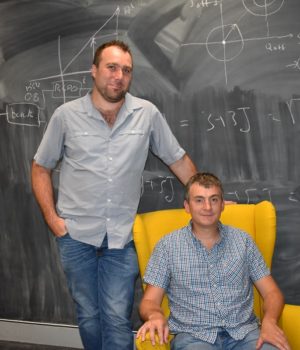Australian semiconductorIoT start-up, Morse Micro, has secured $23.8 million in Series A funding to take its ultra low power Wi-Fi HaLow chip to mass production.
Ray Stata, founder and chairman of semiconductor multinational Analog Devices (NASDAQ:ADI), was appointed to the Board, joining Andrew Terry and Michael De Nil (Morse Micro co-founders) and Mike Nicholls (Main Sequence Ventures partner).
What does this funding raise mean for the IoT startup?
Further to funding mass production, the cash injection will also be used to double Morse Micro’s team size across multiple local and
According to Ray Stata, Sydney is an ideal location for the company to headquarter its operations.
“
“Morse Micro founders, Andrew Terry and Michael De Nil, are two of the industry’s most talented and experienced Wi-Fi chip designers.”
What prompted the investors to back the startup?
Main Sequence Ventures co-led Morse Micro’s seed round and were keen
“This, combined with the fact that the new chip fills a gap in a number of fast-growing segments, gave us the confidence to invest further.”
According to Morse Micro co-founder, Andrew Terry, this overperformance resulted from a tailored approach to product development and market fit.
“Designing for the IoT is challenging as the requirements are very different to other markets,” said Mr Terry. “So we started from scratch and designed an architecture specifically suited to the demands of the IoT and to the various markets where its many applications were most suited.”
What does Morse Micro’s new tech do?
Morse Micro’s chip uses a 900MHz radio band which boasts extended range
In addition to this, Morse Micro’s chip also supports high bandwidths
This enables its use in a wide range of applications beyond the traditional IoT use cases of smart homes and sensor networks, including industrial controls, asset management, video, retail signs
The company was founded in 2016 by Andrew Terry and Michael De Nil, two Wi-Fi chip designer who left US Wi-Fi chipmaker Broadcom to start Morse Micro. Their mission was to develop a new breed of ultra-low power Wi-Fi chips with an extended range suitable for the Internet Of Things.
The company was initially funded by Startmate and a group of angel investors in December 2016 and raised a $4.5M seed round in October 2017 from Main Sequence Ventures, PAN and Blackbird.






![Five ways to manage your time by managing yourself, with Helen Ebdon [CHEAT SHEET]](https://anthillonline.com/wp-content/uploads/2015/07/ebdon-3d-cover-01--300x194.png)
![Learn how to generate more leads in one month than most competitors would in one year! [FREE REPORT]](https://anthillonline.com/wp-content/uploads/2015/08/Capture4-100x75.jpg)

![Want more credibility and influence? Unlock the 12 principles of persuasion checklist [FREE DOWNLOAD]](https://anthillonline.com/wp-content/uploads/2016/03/james-persuasion-and-influence-nfsu-02.pdf-Box-2016-03-24-15-09-44-100x75.png)
![How to zig when everyone else is zagging, with Julio De Laffitte [CHEAT SHEET]](https://anthillonline.com/wp-content/uploads/2015/08/Capture2-100x75.jpg)
![Four Page Digital Marketing Strategy [FREE RESOURCE]](https://anthillonline.com/wp-content/uploads/2015/01/FOUR-PAGE-IMAGE-100x75.png)

![What’s next for Google? Find out from Larry Page [VIDEO]](https://anthillonline.com/wp-content/uploads/2014/08/LarryPage-300x350.jpg)
![Seth Godin explains why you need to listen to your lizard brain [VIDEO]](https://anthillonline.com/wp-content/uploads/2013/10/SethGodin2-300x350.jpg)
![The Alchemy of Negotiation with Matt Lohmeyer [FREE REPORT]](https://anthillonline.com/wp-content/uploads/2015/07/Capture-300x194.jpg)
![How to market your business when you don’t have a business yet [CHEAT SHEET]](https://anthillonline.com/wp-content/uploads/2016/01/oli-gardner-memes-02-100x75.jpg)
![Seven essential steps to a successful podcast with Loren Bartley [Cheat Sheet]](https://anthillonline.com/wp-content/uploads/2015/11/Screen-Shot-2015-11-26-at-11.21.58-100x75.png)
![How to price your product or service in 8 steps with Steve Major [FREE INFOGRAPHIC]](https://anthillonline.com/wp-content/uploads/2015/07/Screen-Shot-2015-11-26-at-11.40.10-100x75.png)
![New Zealand’s Xero eyes US IPO, further disruption as subscribers increase [INFOGRAPHIC]](https://anthillonline.com/wp-content/uploads/2014/07/sruuuuujana-212x194.png)
![Ever wonder if your ‘content marketing’ is really just crap? You gotta see this! [INFOGRAPHIC]](https://anthillonline.com/wp-content/uploads/2014/08/content-100x75.jpg)
![7 Business Lessons From Game of Thrones [INFOGRAPHIC]](https://anthillonline.com/wp-content/uploads/2014/10/infographic-games-of-thrones-041-100x75.jpg)
![How to build your own Media Empire… In seven steps with Nathan Chan [INFOGRAPHIC]](https://anthillonline.com/wp-content/uploads/2014/10/Nathan-Chan-Infographic-e1413419529176-100x75.jpg)
![5 Business Lessons From Tinder [INFOGRAPHIC]](https://anthillonline.com/wp-content/uploads/2014/10/Tinder-Elegant-Infographic-100x75.jpg)



